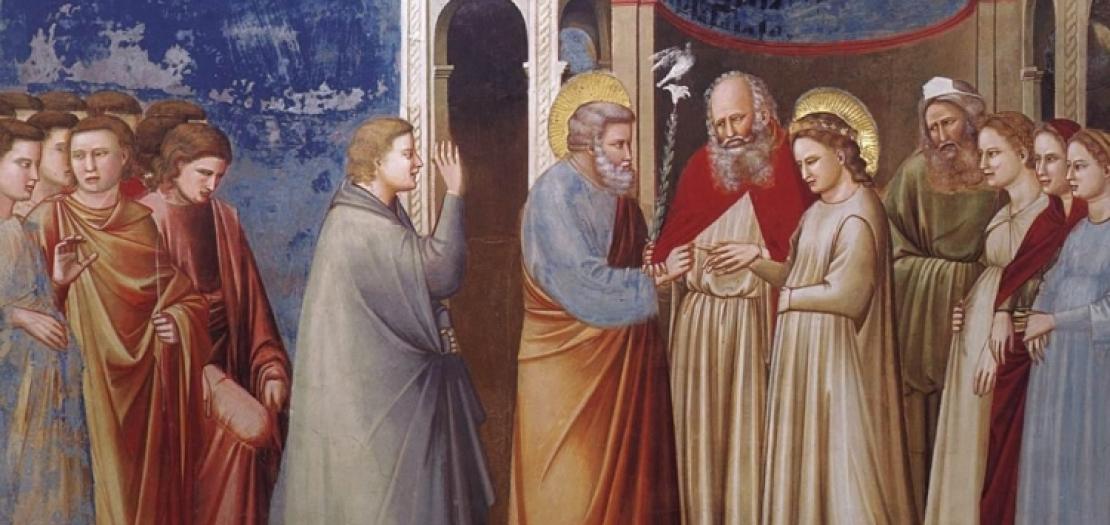Issued by the Catholic Center for Studies and Media - Jordan. Editor-in-chief Fr. Rif'at Bader - موقع أبونا abouna.org

Following is the text of meditation by Cardinal Pierbattista Pizzaballa, Latin Patriarch of Jerusalem for the 26th Sunday of ordinary time, dated October 6, 2024:
In today's Gospel reading, (Mark 10:2-16) we see that Jesus, now in Judea, (Mark 10:1) is approached by some Pharisees who question Him about whether a man is permitted to divorce his wife.
We can begin to understand this passage from the opening of the dialogue, where the Pharisees ask if it is lawful to divorce. (Mark 10:2) Shortly after, they mention that Moses permitted them to write a divorce certificate to separate from their wives. (Mark 10:4)
The Pharisees are focused on understanding what is allowed and what is forbidden by the Law. They don't believe they can discern such matters on their own, using their conscience before God. Nor do they recognize that it is within the depths of the heart that God reveals the one true law He has given to humanity—the law of love.
These questions reflect an entirely different perspective on faith, one's relationship with God, and life as a whole. For the Pharisees, faith is about adhering to specific rules and remaining within defined boundaries. Once these are observed, they believe they can feel at peace with God and others.
We shouldn’t deceive ourselves into thinking that this mindset is exclusive to a few individuals who are overly focused on the law. The same reasoning is present in Peter’s question about how many times one should forgive. (Matthew 18:21)
This approach to life is also quite convenient because the law is something we need, and Jesus does not oppose it. The law establishes the minimum required of us—it sets boundaries for our obligations, without demanding generosity or pushing us beyond what is merely just. Ultimately, the law can serve to justify our selfishness and hardened hearts, as Jesus notes: "Because of your hardness of heart, he wrote this commandment for you". (Mark 10:5)
Jesus completely shifts the axis of the discourse: the foundation for our faith and ethical behavior is no longer centered solely on the law, but on the purpose for which our lives were created—the calling that each of us has received and the immense dignity inherent in God’s design for man. It is not the law that serves as the standard for discernment, but rather our unique vocation. It is not an external rule that dictates what we should do, but an internal truth that reveals who we truly are.
To know what we must do, we need to consider what we can do: we can show compassion, offer welcome, provide care, and extend forgiveness. In doing so, we can embody the essence of God's life.
By referencing the principle of creation—"But from the beginning of creation, he made them male and female" (Mark 10:6)—Jesus emphasizes this point to his listeners. He asserts that the standard for our lives cannot be determined by a set of rules to follow, but rather by the fulfillment of this original design, which calls Man to a continual journey of Exodus toward a fuller life, which will never be fully achieved.
The original intention is to be capable of loving faithfully, which means keeping one’s heart open to others and nurturing one’s connections and relationships above all else.
It is therefore not a matter of obeying a law, but a person, the people we love, and to do so even when this obedience asks us to give our lives.
While the law aims to establish the minimum requirements for being deemed righteous —a baseline we must not fall below—the law of love, on the contrary, offers a pathway for gradual growth and opens life to the possibility of growing in humanity.
It is not merely about safeguarding a minimum standard, as the law of love cannot impose limits and varies for each individual.
The important thing is not to be content with having a clear conscience, but rather consistently reaching out to others and continually beginning anew in our journey to know and love them.
+Pierbattista
 Jerusalem: Augusta Victoria Hospital offers free treatment for Gaza children diagnosed with leukemia
Jerusalem: Augusta Victoria Hospital offers free treatment for Gaza children diagnosed with leukemia  Text of meditation by Cardinal Pizzaballa, Latin Patriarch of Jerusalem, for second Sunday of Christmas
Text of meditation by Cardinal Pizzaballa, Latin Patriarch of Jerusalem, for second Sunday of Christmas 




